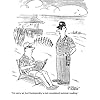Inés Arteta
asked:
I would not recommend a book whose narrator I could not trust. Who is this omniscient narrator? Why is the 14 year old Homer so philosophical, thinks and reacts as a 50 year old. If it is due to the early loss of his father, his need to work and the absence of his older bother, (not spoiling), then that was not enough for me. Did´t the narrator make you uncomfortable through out the text?
To answer questions about
The Human Comedy,
please sign up.
Laurel
Not at all. I would recommend this book; it's a classic I have read several times. I think you're taking it too literally; some of the best books require a suspension of disbelief. Think of it as an allegory.
Wayne
I won't go into a long discourse except to say that you have approached the book from a mechanical aspect when the book is speaking to an altogether different focus on what life is about.
Lisa Powell
Homer is not the narrator. We have an omniscient third person narrating, although the point of view of different characters are favored in each chapter.
Matt Ostrander
Your observations are valid, and if I approached this work as a realistic novel, I would feel the same way. The world that Saroyan depicts is not realistic now, and probably wasn't in the 1940's either. There are certainly many spots in this book in which the children seem wiser than the adults. I think that Saroyan would like us to come away with the feeling that we have (or should have) a basic goodness and compassion in us. The priorities and complexities of life make us forget that. If we do not constantly refresh our virtues, they become corrupted or lost, so that it's often the youngest of us who are the least corrupted. In this way, the novel is far more Romantic than Realist.
My favorite authors (Steinbeck, Frost, Naomi Shihab Nye) all return to this need for compassion again and again. Their message is that it's a hard world, and we need to help each other. A lack of realism doesn't hurt that message.
My favorite authors (Steinbeck, Frost, Naomi Shihab Nye) all return to this need for compassion again and again. Their message is that it's a hard world, and we need to help each other. A lack of realism doesn't hurt that message.
Irena Pasvinter
I had no problem with the omniscient narration. Many books are written this way. But I had a big problem with Homer and other characters all delivering philosophical speeches which were totally unrealistic and out of character. People don't go around speaking about the sense of life and the meaning of death on every corner, and definitely not in such numbers and frequency as in this book. They also don't break into beautiful long monologues about whom to hate and how to live when they find out about tragedies. Almost everybody above 14 years old was so goodly and so philosophical that frankly, it made me sick. The book often sounded like a moralizing preachy tale for young readers.
Katrina McCollough
To me the narrator was almost as much Ulysses as any of the other characters equally, it was a view of individuals lives. Homer was a constant thread but no, I can't agree with being uncomfortable whatsoever. He was a boy growing up and it was a well done parallel considering the small town, innocent setting placed within the crazy war that kills everyone.
Maurizio (matemati)
Yes he did. I felt the same as you about Homer and most of the other characters too. Nearly everything in this book seemed so fake to me.
Oz
where can I find a review of the book?
Kenneth Jardin
This book reminds a bit of my childhood, as seen through the eyes of an adult looking back...
About Goodreads Q&A
Ask and answer questions about books!
You can pose questions to the Goodreads community with Reader Q&A, or ask your favorite author a question with Ask the Author.
See Featured Authors Answering Questions
Learn more










